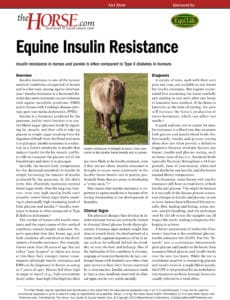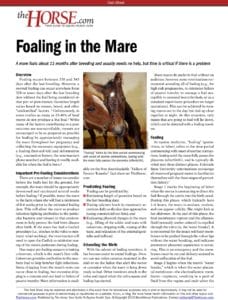
Insulin Resistance
Equine Insulin Resistance is a reduction in sensitivity to insulin that decreases the ability of glucose to be transported into the body’s cells from the bloodstream.


Equine Insulin Resistance is a reduction in sensitivity to insulin that decreases the ability of glucose to be transported into the body’s cells from the bloodstream.
Lead a veterinarian to a horse with equine Cushing’s disease and he or she will likely try to diagnose the horse by measuring blood levels of adrenocorticotrophic hormone (ACTH) in a single sample at a single point in time. Lead researchers from Pegasus Equine Diagnostics Ltd., in Nottingham, United Kingdom to the same horse and they’ll measure ACTH levels over 24 hours at multiple t
Music might be an outburst of the soul (Frederick Delius) but strangles is an outburst of a horse’s lymph nodes, and when you put the two together it amounts to many disappointed fans of the Royal Canadian Mounted Police’s (RCMP’s) famed Musical Ride. Equine strangles is a highly infectious disease of horses caused by the bacterium Streptococcus equi that causes a thick, greenish nasal discharge,
A specially designed surgical laser can help control fluid pressures in the eyes of horses with glaucoma and help maintain vision, but it does not alleviate the need for the continued use of topical eye medications, according to David A. Wilkie, DVM, MS, Dipl. ACVO, and colleagues from the Colleges of Veterinary Medicine at Michigan State University and The Ohio State University (OSU).

Two novel discoveries about how different types of tendons age and “refresh” themselves made by researchers from University College London in the United Kingdom help explain why aging horses are atrisk for tendon injury. Tendons play key roles in locomotion as they are the link between muscles and bones. Ten
A cream containing 5% imiquimod (an immune-boosting drug) effectively and completely treated aural plaques in horses, but side effects of the drug (e.g., inflammatory reaction) limit the cream’s usefulness, reported a group of researchers from Minnesota and California.
Aural plaques are usually white, crusty lesions covering a layer of shiny red skin found on the inside (concave surface) of a

Lyme disease is caused by a spiral-shaped bacterium called Borrelia burgdorferi that is spread to some mammals via the bite of specific hard-bodied ticks. Also known as borreliosis, it is widely considered the most important insect-borne bacterial infection in North America. But it is unknown whether ticks transmit the bacterium to horses and cause disease or because the two coexist.
Lasering the soft palate of horses for treating dorsal displacement of the soft palate (DDSP) causes scarring but does not “stiffen” the palate as hypothesized, reported Kira Alkabes, DVM, from the College of Veterinary Medicine at Purdue University.
Three horses all on a single premise in Cochise County, Ariz., remain the only horses in the country currently diagnosed with vesicular stomatitis (VS) virus.
VS is a disease that causes blister-like lesions in the mouth and on the dental pad, tongue, lips, nostrils, hooves, prepuce, and teats of livestock in the southwestern United States.
“Arizona hasn’t had a case since 2005,” repor
Portable, hand-held blood analyzers that measure various blood values such as electrolytes and pH are a valuable tool and provide improved patient care, reports a Brazilian research team led by Juliana Peiró, DVM, PhD, from the Department of Clinics, Surgery, and Animal Reproduction, School of Veterinary Medicine, Unviersidade Estadual Paulista. “When diagnosed early,
Nearly 5,000 horses from 500 different farms helped identify anhidrosis factors for University of Florida researchers. Geography, breed, and use of horse were examined to determine factors for anhidrosis–the lack or decreased production of sweat. While it is widely known that some horses lose the ability to sweat properly in hot, humid climates like Florida, accurate information
Mutations in the gene called OAS1 contribute to a horse’s ability to fight West Nile Virus (WNV), reported a group of researchers led by David Adelson, PhD, Professor and Chair of Bioinformatics and Computational Genetics from the University of Adelaide in South Australia. Previous research in mice indicated that the OAS genes played a role in immunity to flaviviruses (such as
If someone says he or she can think or talk about equine neurology without becoming dizzy, that shows only the person has not understood anything about it… To take the dizzy factor out of understanding neurologic disease in horses, I.G. Joe Mayhew BVSc, FRCVS, PhD, Dipl. ACVIM, ECVN, head of Equine Massey and professor of equine studies at New Zealand’s Massey University, has dedicated much of
To take the dizzy factor out of understanding neurologic disease in horses, I.G. Joe Mayhew, BVSc, FRCVS, PhD, Dipl. ACVIM, ECVN, has dedicated much of his career to helping practitioners and owners understand equine neurology. He made several presentations at the 11th Congress of the World Equine Veterinary Association on topics ranging from simple reviews of common neurologic diseases
In an equine study using “proteomic” technology that systematically analyzed the proteins in skeletal muscle biopsies, a research team from The Netherlands identified a form of the protein creatine kinase that could be a marker for acute tying-up in horses. “Tying-up or rhabdomyolysis in horses is a serious condition that is characterized by obvious discomfort, abno
Stay on top of the most recent Horse Health news with